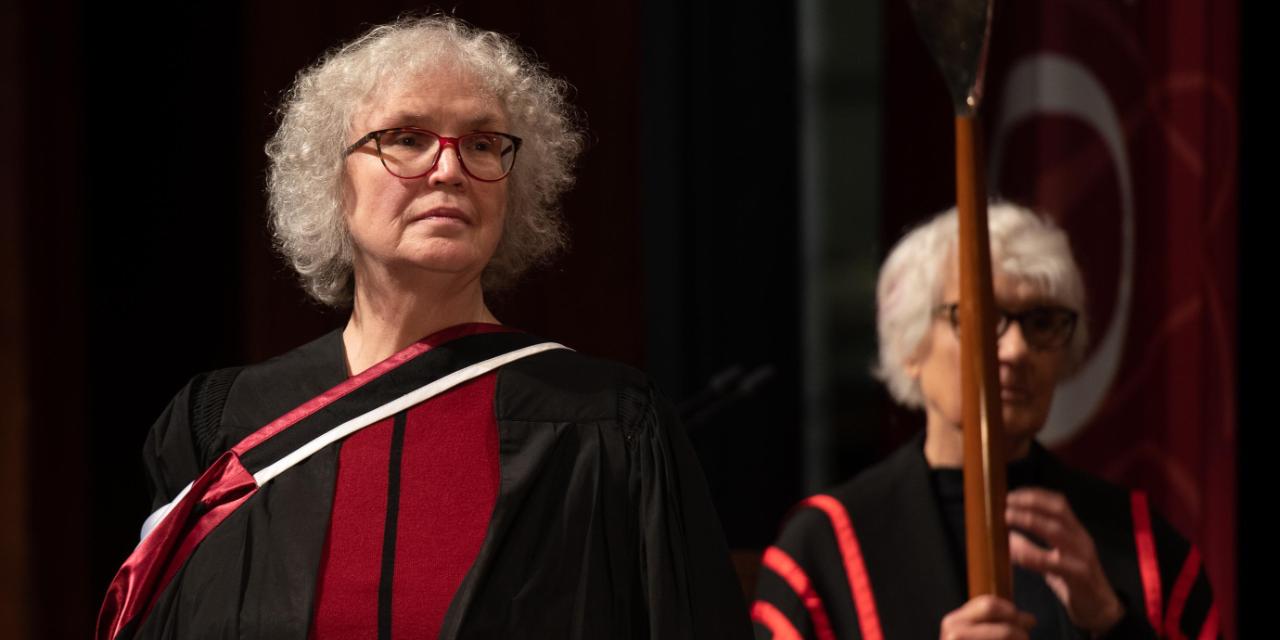Living language
In Old English, they called it a “wordhord” (word-hoard), and it refers to the personal stockpile of words and phrases that a poet draws from when composing their poetry.
When Mary Dalton first encountered the Dictionary of Newfoundland English, originally published in 1982, her own private wordhord expanded to bursting.
It’s not that the words in the dictionary were new to her. She had grown up in her hometown of Harbour Main surrounded by those words. She knew them and their cadences well. But as a young student, she had been told to avoid those words and their pronunciations. That she had to speak according to a set of formal rules established by others in other places.
The dictionary returned Prof. Dalton to the vital speech of her community. And nothing seemed more inviting than to celebrate that language in all its musical and muscular glory.
It was Dr. Patrick O’Flaherty who first encouraged her to read the Newfoundland dictionary and write an essay about it. She followed his keen direction, but the essay remained unwritten. Instead, she turned to poetry.
Her first collection, The Time of Icicles, appeared in 1989. Allowing the Light was published in 1993.
Then in 2003, what she would later call the “vernacular strain” in Newfoundland verse found perhaps its most potent expression in the poems of Merrybegot. Named using the local word for a joyous conception outside of marriage, the book is an adamant and multifaceted display of the artistic resources inherent in Newfoundland English.
It is considered by many to be the most important and influential collection of poems published by a Newfoundlander so far in the 21st century.

Mary Dalton was designated professor emerita by Memorial University in 2019. Photo from Memorial University Archives.
Prof. Dalton earned her bachelor’s degree in English from the University of Toronto and her master’s degree at Memorial. She conducted her doctoral study as a Canada Council fellow at Liverpool.
As a faculty member in Memorial’s Department of English, she became a central advocate for Newfoundland and Labrador literature and contemporary poetry, teaching countless students to listen deeply — to language, to place and to the latent music of the vernacular.
Behind the scenes, she edited TickleAce, a literary journal, from 1980 to 1986, and steered the academic journal Newfoundland Studies through the late 1980s.
In 2009, she founded the SPARKS Literary Festival and acted as director until 2015. She referred to the festival as a “word-spree.” And now SPARKS is the English department’s literary gem, bringing writers at various stages in their careers together to celebrate the creative pulse of a community.
Prof. Dalton went on to serve as poet laureate of St. John’s from 2019 to 2023. She used the platform to bring poetry into public spaces with events like Cornucopia: Poets and Poetry of St. John’s and by launching the poetry podcast Flahoolic in collaboration with the city and CHMR radio. In each episode of Flahoolic, she reads and discusses poems of place and memory.
She published Edge: Essays, Reviews, Interviews in 2015 and The Vernacular Strain in Newfoundland Poetry, the text of her Pratt Lecture, in 2022.
After the success of Merrybegot, her poetry adventured into new formal territory. Red Ledger (2006) revelled in riddles. The collection Hooking (2013) engaged with the cento, an ambitious ancient form in which poems are built entirely out of quotations. And in Interrobang (2024) she makes use of riddles once again along with a series of triads — a short poetic form that includes a list of three things and achieves a metaphorical expansiveness through brevity.
Her poetry has been widely anthologized and richly decorated. She’s won the E. J. Pratt Poetry Award and the N.L. Book Award for Poetry. Hooking was celebrated as a top book of the season by both the Globe and Mail and CBC.
Prof. Dalton’s use of local vernacular in her poetry is just one of the elements that has earned her work acclaim. And her use of Newfoundland words and phrases has, at times, been oversimplified as an act of cultural preservation.
It’s true that when a book lies dormant on a shelf it preserves the words contained within. But when the book is opened and one of her poems is experienced as an event — whether now or 50 years from now — the language lives in all its rhythmic energy and taut efficiency. It lives with all its powerful potential in the present tense.
At a time when novelty is valued over nuance and when the media we consume seems mired in an ever-encroaching monoculture, Prof. Dalton’s voice reminds us that depth, discipline and local resonance matter. She’s accomplished so much more than simply preserving the sounds of our speech — she’s amplified what it means when a poetry rooted in place reaches out to speak to the world.
-370x493.jpg)